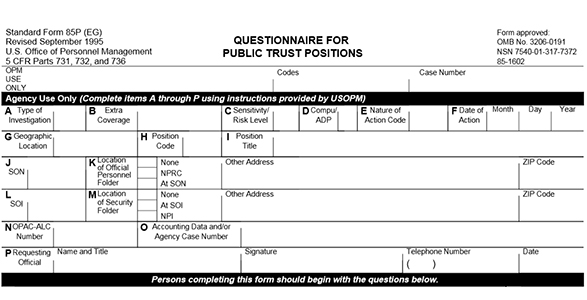Suitability and Fitness (Public Trust) Adjudications
Government employment requires hiring responsible people for judicious roles such as managing finances, overseeing processes, inspecting compliance, and protecting people and assets, among others. While many government jobs do not require a security clearance, certain sensitive positions—often ones for protection of national security—demand especially knowledgeable and responsible employees. Such positions are designated as “Public Trust Positions.”

How Public Trust Positions are Established
Employing agencies determine risk to designate the type of position: sensitive or non-sensitive. The risk could reflect both national security issues involving classified/sensitive information or activities that are not classified. In both cases, different types of background investigations are conducted.
For non-national security positions, background investigations are appropriate for the amount of risk associated with the position. For example, a designated position involves the protection of government funds. An accountant or comptroller behaving badly will cause a degree of risk as they manage the finances.
According to the SF 85P Questionnaire for Public Trust Positions, an appropriate background investigation is necessary to determine suitability or eligibility to work in public trust or sensitive positions. Applicants for and those already employed in the positions, are required to have the appropriate investigation based on the sensitivity level of the position.
Managers work with human resource personnel to identify, authorize, and designate positions as National Security and public trust positions. Then, they send the appropriate investigation request to the Office of Personnel Management (OPM) prior to but no later than 14 days after the appointment to the public trust position.
Public Trust Positions
The following job descriptions are just a few examples of those requiring an OPM investigation and for some obvious reasons.
- Immigrations, customs, borders and port protection agents
- Public safety and health workers
- Federal police officers
- Comptrollers
- Contracts managers
One of the most ubiquitous positions is the protection of government information technology systems. Employees assigned computer systems for their daily work performance might fit this category.
Managers use the Position Designation of National Security and Public Trust Positions tool available at www.opm.gov to determine the appropriate risk level. The tool establishes risk level by the potential impact to the service if employee is not suitable. When the public trust position is outside of sensitive national security considerations (think CONFIDENTIAL, SECRET, TOP SECRET), then they select non-sensitive risk levels of low, moderate and high.
Types of Background Investigations
Moderate Background Investigation (MBI)
Requests for this investigation are submitted with SF 85P (Questionnaire for Public Trust Positions) and primarily conducted for Moderate Risk Public Trust (MRPT) positions. Coverage includes NACI requirements plus:
- Reference contacts
- Law enforcement checks (5 years- inquiry and/or record)
Background Investigation (BI)
Requests for this investigation are submitted with SF 85P. The BI is primarily conducted for High-Risk Public Trust positions. Coverage includes MBI requirements plus the following variables:
- Personal subject interview
- Education (2 years/verification of degree)
- Residence (3 years)
- Law enforcement checks (5 years)
- National Agency checks
- Credit search of national credit bureaus
Public Trust positions require persons with not only the right job skills, but a high degree of trustworthiness. Agencies determine whether the positions are sensitive or non-sensitive and if non-sensitive, determine the risk level of low, moderate or high. The higher the risk level, the more impacting employee misbehavior can be. Depending on the risk level, the appropriate investigation is initiated.
 FBI Identification Division (Fingerprint & Name) and Records Management Division (Investigations)
FBI Identification Division (Fingerprint & Name) and Records Management Division (Investigations)
Suitability and Fitness Adjudications
Suitability Factors:
- Misconduct or negligence in employment
- Criminal or dishonest conduct
- Material intentional false statement, deception or fraud in employment
- Refusal to furnish testimony as required by 5 CFR 731m sec. 5.4.
- Alcohol abuse
- Illegal drug use
- Knowing and willful engagement in acts/activities designed to overthrow the U.S. Government by force.
- Statutory or regulatory bar to employment
Additional Considerations:
- Nature of position
- Nature and seriousness
- Circumstances surrounding the conduct
- Recency of the conduct
- Age at the time of the conduct
- Contributing societal conditions
- Rehabilitation
Suitability and fitness adjudication determine whether an individual can be a federal employee.